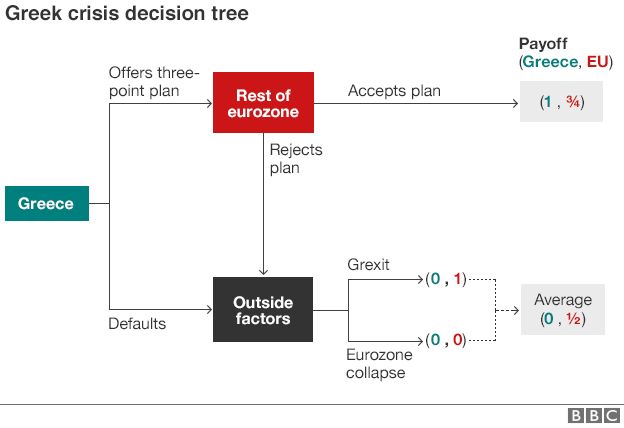Game Theory and The Greek Debt Crisis
Recently, Greece just avoided defaulting on its debt, making a key payment to the European Central Bank after receiving aid from other Eurozone countries. However, before Greece made the payment to the European Central Bank, the Greek government faced a crucial decision: make a deal with the Eurozone to avoid defaulting on its debts or leave the Eurozone in what is referred to as a “grexit”. Before making any decisions, the Greek finance minister, Yanis Varoufakis, could have made a decision tree with Greece and the Eurozone players along with other random outside factors, called “nature”. The payoffs of each player when the game ends are shown in the brackets below:

If Greece avoids defaulting on its debts by offering the Eurozone a plan which it accepts, Greece is content so the payoff is 1. The Eurozone would consequently have to take a loss as a result of Greek debt so its payoff is ¾. So, the overall payoff if the Euorzone accepts Greece’s plan is (1, ¾). If the Eurozone rejects the deal, then Greece will default on its debts. The article discusses two possible results in this scenario. The first result is the “grexit” which is bad for Greece but good for the Eurozone since they do not have to deal with Greek’s debt anymore. Accordingly, the payoff in this scenario is (0,1). The second scenario is Greek’s departure leading to the collapse of the Eurozone. This is bad for both Greece and the Eurozone so the payoff is (0,0).
Taking all events into consideration, the best course of action appears to be the Eurozone accepting the Greek plan, in turn preventing Greece from defaulting on its debts. This plan benefits both players, so unlike the Prisoner’s Dilemma discussed in class, both players avoid detrimental outcomes.
Source: http://www.bbc.com/news/magazine-33254857
